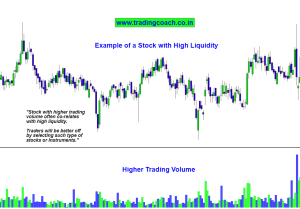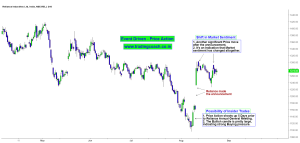Trading in the financial markets is a daunting business. It can make a person financially secure and prosper; on opposite spectrum, trading can lead to severe losses. Experienced traders are good at managing risks and producing consistent returns, through balancing both emotions and risks. Often novice traders or Intermediate traders enroll in trading courses to learn trading strategies, new ideas and apply those ideas to make profits. Joining a trading course has great benefit, when compared to self learning. Trading courses effectively cut your learning curve and help you to walk on right track without wasting your time.
But one shouldn’t expect everything be fulfilled from a trading course or training programs. Successful trading is about having a great trading edge, combined with successful management of emotions and risks. A good trading course or trading education helps you to find a right trading edge based on your personality and trading style. Successful management of emotions and risks need to be cultivated by traders.
In laymen terms, trading edge is defined as taking more successful trades and less losing trades, over long run.
A good trading course (whether in stock trading, commodities trading or Futures – options trading) should get you the knowledge and skills that you need, In order to survive the ups and downs of trading. Trading course should cover techniques and trading strategies which you can apply practically on live markets. In this article, I’ll cover 7 most important things you need to know before joining any trading course. It doesn’t matter whether you’re a beginner or have some experience in financial markets, you will find this handy.
1. Avoid institutions and trading courses with large marketing and hypes
Any technical trading programs creating large market campaigns, hypes with attractive posters should be a no-no for practical traders. Institutions which involve in such a kind of marketing activities have little or less to do with live markets. They are only in the business of acquiring new students and teaching them. Most trading courses in India are designed in such a way. These institutions are in the business to teach traders some useless stuff which has little or no practical importance.
Some trading academies invest large capital on marketing to attract novice traders; these academies teach some basic things which are practically unimportant for traders. Their primary expectation is to make profits by teaching traders, not adding value. Clearly one should avoid this kind of trading courses in India.
2. Don’t pay too much cost to learn trading
Trading education programs should be affordable to traders. The sole purpose of training is to cut the learning curve and effectively save trader’s time. Trading is a strategical business similar to chess; it takes experience and motivation to be a successful trader. A good trading course shouldn’t charge too much in terms of fees. Further a good trading mentor is striving to provide practical value and ideas for trading community, it’s unnecessary for him to charge large amount of fees.
3. Learn only from traders and experienced professionals
Only those have decent experience in financial markets can provide practical knowledge in trading stocks, commodities or any other instruments. In this case, trading mentor or instructor should be professional trader. There are many scenarios where a trainer is a certified technician who has no experience in real trading; it’s like learning to swim from a certified teacher, who don’t swim.
Trading or investing is a tough business, only people with well versed experience in trading can become ideal mentors or teachers. Avoid focusing on certifications and education background; instead ask for mentor’s experience.
4. Look for guidance and help even after the training period
Trader’s development doesn’t ends, just after enrollment in training program – it’s an ongoing process. Learning doesn’t stops and successful traders are more knowledgeable than others. So a trading course should help you in the process of forever learning, trading mentor should give help and guidance even after training program is completed. Especially he should help you out in focusing on right information and practically important things.
Novice traders need more help and guidance in applying the lessons, even after learning them. Always opt for guidance and support from your trading coach.
5. Avoid basic Technical analysis courses or basic trading courses
Basics are literally everywhere on the internet, it’s even enough to know the basics theoretically. Basic fundamental analysis and technical analyses are so easy; you can learn it within a day or two. Why do you spend your hard-earned money in learning these basics, which are available everywhere on internet?
Moreover these basic ideas are just foundation for knowledge; they don’t have any practical value for traders. Trading courses that teach basic technical analysis and fundamental analysis are useless and waste of money. If you want to learn the basics just go to Investopedia – you’ll find everything there.
6. Trading course should be conducted in live market
Many coaches or trading instructors pull examples of perfect chart patterns from selected price charts. This creates a sense of wrong perception in Novice traders and influences belief that trading is very easy. Once you look at live markets, everything seems complicated and mess, this is what happens if your coach don’t cover the topics in live market. Trading is a simple and profitable business, but not at all easy.
Methods and concepts covered in training sessions should be demonstrated in live markets or else it’ll be unclear for many traders. Taking this into consideration, your mentor must put effort to show examples during live market hours.
7. Tips providers and full time educators are totally useless
There are several institutions and trading academies which offer trading courses and won’t have any stake in markets. Some instructors are always busy providing education to beginners and novice traders; they don’t even know yesterday’s closing price of Nifty. There are other few companies which make a living by providing tips and trading courses. These guys won’t even have a trading account, but suggest others to follow their advice. Such institutions and trading educators are totally useless. One should avoid these companies.
There is an old adage in market – “those who can’t trade, teach others”, it’s not entirely true. Some great traders are excellent teachers. To name a few we can say, Richard Wyckoff, Victor Sperandeo, Ed sekyota, Paul Wilmot etc. are great teachers, as well as traders. Even today we can see some traders offer value to trading community through courses and education programs. Before enrolling into any stock trading courses or commodity trading courses, you should know your instructors and their experience in financial markets. A trading mentor can add great value to your foundation, so choose them wisely. If you have any feedback or points, please add them in comments.









5 thoughts on “Trading Courses in India – 7 Things to Know Before Joining”
plz let me know about course contents and fees.
Hi Virendra
Kindly drop an email to info@tradingcoach.co.in
or call us on +919108911590
Excellent Article Balaji… There are many people who fleece you money and train you on different charts… They do not even care if you understand or not….
Really amazing information sir, salute you sir.
plz let me know about course contents and fees.